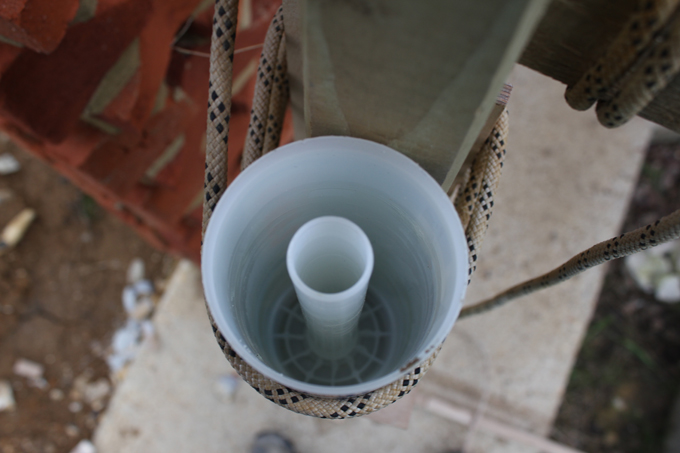In this post I wrote about my gap filling tests. I decided to go with the resin/mortar combination. I ordered some resin from Screw-fix because it is relatively cheap and because I had spoken with a structural engineer last summer and he had recommended it. The problem is, it comes in a proprietary tube that doesn't fit in a regular caulking gun. I had already decided that I would make a custom tool to help me apply it to the bricks, but I never imagined the tool would require so much effort to make.
Here's what I've come up with. It is based on the same principle as the clay extruder I made last fall.
The first problem was the extreme amount of pressure that is applied to the pieces. Initially, the notches on the vertical post were pieces that I attached with screws, but the force of the bar was ripping them out. So instead, I notched out the post itself. As well, the plate where the tube rests had to be re-anchored with extra support.
The second problem was the shape of the resin tube.
It has a stem in the middle that doesn't slide. So I needed an extruding stick that was tube-shaped. Luckily, the workshop has a bunch of random bits and pieces, so I found a PVC pipe. I thought I had this working well, but then I noticed that the resin wasn't mixing properly. Normally, there is a white resin and a black hardener and they mix in the nozzle to produce a grey substance. I wasn't getting any of the hardener. I puzzled over this for a while until I realized that there is another sliding part inside the stem. My extruding stick needed to have two parts- a tube-shaped part for the outside, and a rod for the inside.
The workshop pulled through again. I found a smaller PVC pipe and a cable tightener that I could jam in the end. Above is the assembly: the small tube goes inside the big tube and all the parts are threaded onto the bolt.
It still takes a lot of strength to pull down on the bar. I have to keep reminding myself to hold it closer to the end because I can really feel the mechanical advantage with a longer lever arm. My hand just keeps sliding down because I want to see how the resin is coming out onto the brick.
The Screw-fix resin is relatively cheap, but their proprietary gun costs £30 (when a normal caulking gun is under £5). They know that anyone who buys their products will also have to buy their tools. I think I've managed to thwart their plans...for now.
Here's what I've come up with. It is based on the same principle as the clay extruder I made last fall.
The first problem was the extreme amount of pressure that is applied to the pieces. Initially, the notches on the vertical post were pieces that I attached with screws, but the force of the bar was ripping them out. So instead, I notched out the post itself. As well, the plate where the tube rests had to be re-anchored with extra support.
The second problem was the shape of the resin tube.
It has a stem in the middle that doesn't slide. So I needed an extruding stick that was tube-shaped. Luckily, the workshop has a bunch of random bits and pieces, so I found a PVC pipe. I thought I had this working well, but then I noticed that the resin wasn't mixing properly. Normally, there is a white resin and a black hardener and they mix in the nozzle to produce a grey substance. I wasn't getting any of the hardener. I puzzled over this for a while until I realized that there is another sliding part inside the stem. My extruding stick needed to have two parts- a tube-shaped part for the outside, and a rod for the inside.
The workshop pulled through again. I found a smaller PVC pipe and a cable tightener that I could jam in the end. Above is the assembly: the small tube goes inside the big tube and all the parts are threaded onto the bolt.
It still takes a lot of strength to pull down on the bar. I have to keep reminding myself to hold it closer to the end because I can really feel the mechanical advantage with a longer lever arm. My hand just keeps sliding down because I want to see how the resin is coming out onto the brick.
The Screw-fix resin is relatively cheap, but their proprietary gun costs £30 (when a normal caulking gun is under £5). They know that anyone who buys their products will also have to buy their tools. I think I've managed to thwart their plans...for now.






Comments
Post a Comment